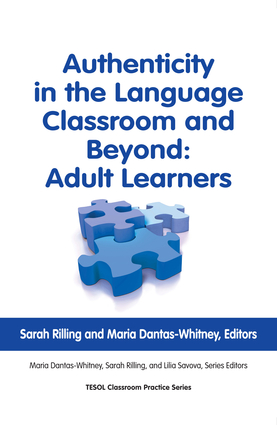Overview
Adult language learners have specific learning goals that reflect their lives within a global society, and adults negotiate multiple and changing identities throughout their personal, academic, and professional lives. Chapters in Authenticity in the Language Classroom and Beyond: Adult Learners highlight how teachers have the ability to transform language instruction from a mechanical learning experience to a dynamic interaction to assist learners in reaching real-world goals. Rather than focus only on native-speaker norms of language production, English language instruction can provide adult learners with opportunities to create and act on their own texts, engage meaningfully with audiences, and develop interactions that mirror their purpose for learning. The chapters in this volume demonstrate how language teaching practices engage learners’ inauthentic experiences, using and producing texts to meet international and localized communication needs. All the chapters in this volume demonstrate that authenticity is more than just the materials we use. Authenticity also means using language for real purposes. It means engaging students in collaborative learning, involving discussions, negotiations, and decision making. Authenticity is creating real uses for English, not just modeling native-speaker language and culture. With English increasingly being used as a lingua franca to connect second language speakers, authenticity takes on new meanings as we seek to develop learners who can face the challenge of communicating effectively in an increasingly globalized world.Author Biography
Sarah Rilling is an associate professor in the area of teaching English as a second/additional language (TESL) at Kent State University where she teaches courses in applied linguistics in the Department of English. Research includes pedagogical work and lexical analysis focused on inquiry and action in language teaching and nativization processes in modern language contact. Administrative work has resulted in licensure and endorsement programs in TESOL (teaching English to speakers of other languages) and a Bachelor of Arts in TESL at Kent State University. Maria Dantas-Whitney is Professor of ESOL and Bilingual Education at Western Oregon University. She has been a Fulbright scholar in Mexico and Panama, and has directed professional development programs for K-12 teachers of ELLs in Oregon. She has served as president of Oregon TESOL and ORATE (Oregon Association for Teacher Educators). She is the recipient of the AERA Outstanding Dissertation Award in Second Language Research and the TESOL/College Board Award for Teacher as Classroom Researcher. Her publications and presentations focus on linguistically and culturally responsive pedagogy in teacher education, critical reflective practice, and classroom ethnography.


